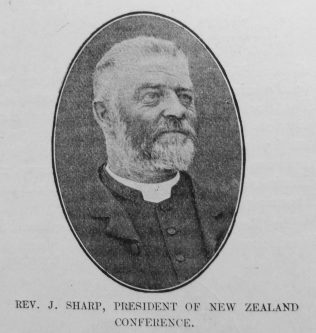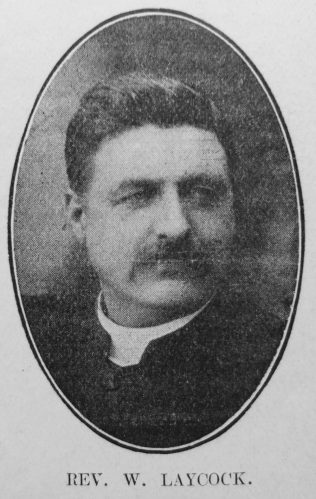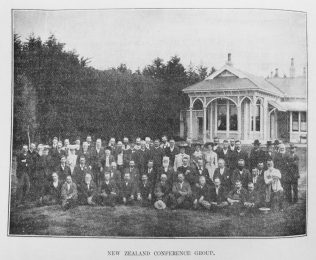New Zealand Conference
Report in the 1905 Magazine





Transcription of Article in the Primitive Methodist Magazine by J. Cocker
The Conference this year was held in Christchurch, the “City of the plains,” and the leading town of the Province of Canterbury. It is one of the four chief cities of the colony, and in population is only exceeded by the city of Auckland. Less than sixty years ago the site of the city was a swamp, the home of the heron and bittern. To-day the city has a population of sixty thousand persons, and boasts of all the improvements of modern civilisation. It has many large and beautiful public buildings, and is probably the most English city in New Zealand. The first settlers were named the “Canterbury Pilgrims;” before leaving London they attended a service in St. Paul’s Cathedral, and on arrival in the Colony they named the New Settlement, Canterbury, after the ancient city of Canterbury, England, and the proposed capital was named Christchurch, after the college of that name in Oxford. Originally the settlement was distinctly Anglican, but the ecclesiastical organisation was not a success, and the Settlement soon lost its distinctly Anglican spirit. Canterbury has proved fruitful soil for Methodism, both our own and the Wesleyan Church having met with considerable success in the Province.
In the history of the temperance movement, Christchurch will ever be known as the city in which the Prohibition flag was first unfurled, and where amid the greatest enthusiasm the No Licence reform movement was started. At the present time, Mr. T.E. Taylor, one of the champions of the Prohibition cause, is senior M.H.R. for the city.
In 1860 a few Primitive Methodists met together in the city and formed themselves into a Society. For a time they carried on a mission, but ultimately the services fell through, several of the leading workers having moved to other parts of the Colony. Eight years later, services were again commenced, and in 1871 the Rev. Robert Ward, the pioneer missionary of Primitive Methodism in New Zealand, was appointed as the first minister of the Christchurch mission. The work prospered, and the surrounding districts were missioned by labourers sent out by the Christchurch station. To-day there are in the Province of Canterbury, six circuits and one branch, with eight ministers labouring upon them.
The Rev. C.E. Ward, son of the Rev. R. Ward, the first missionary of the Connexion in the Colony, and first minister of the Christchurch station, has been stationed on the circuit for the last six years. Mr. Ward is one of the ablest preachers of the Church, is a capable organiser, and a man of energy. During his superintendency the circuit has made considerable progress, two new churches have been built, and a site secured for a third. An additional minister has also been called out.
The Rev. J. Sharp was unanimously elected President of the Conference, the other persons nominated retiring in his favour. The President is “A man of Kent.” After travelling upon several circuits in England, he came out to New Zealand, and for more than thirty years has faithfully served the church in this land. Many are the stories he tells of his experiences in the early days, of long rides on horseback, fording rivers, and hairbreadth escapes, hearty hospitality enjoyed under peculiar circumstances, struggles in forming churches in scattered districts, where now there are fairly sized towns and self-supporting churches. He has faithfully plodded on, and his brethren have shown their appreciation of his work by twice electing him to occupy the Presidential chair, the first time in the year 1889, when the Conference was much smaller than it has become of late years. The President is strong and robust, and in acknowledging the honour conferred upon him, said that he felt he was only about halfway through his ministry.
Mr. E.W. Hall, who was unanimously elected Vice-President of Conference, has for many years been a faithful member of the Connexion, both in England and New Zealand. He is a loyal official of the church, and very liberally has he supported the church of his choice.
The Rev. W. Laycock was, by the unanimous vote of Conference, elected to the position of Secretary. During his twenty-one years’ ministry in the Colony, he has done splendid work for the church. He has a fine physique, a good presence, and is probably one of the best read men in the Colonial ministry, and is also a good penman.
PROGRESS.
Though the extension of the Connexion’s borders in New Zealand is hindered for want of men and money, yet considerable progress is being made. During the year five churches were built, one of them a beautiful structure, which took the place of the first Primitive Methodist Church in the Colony, built at New Plymouth, the town in which the Rev. Robert. Ward preached his first sermon in New Zealand. Seven parsonages or houses had also been either built or purchased during the year. Edendale in Southland had been missioned by Invercargill I. circuit, and a minister stationed upon the mission. It was decided to open a mission in the Waikato, and a missionary was stationed in the town of Hamilton.
An increase of eighty-seven members was reported, also twenty teachers, and a hundred and one scholars.
THE FUNDS.
The finance of the church was found to be in a very healthy state. The Loan Fund is now valued at £1,302. The Fire Insurance Fund is valued at £1,029, and is steadily growing. The S.M.W. and O. Fund is now valued at £2,755. During the year £1,339 had been raised to carry on the work of the Sunday Schools.
The gross income for trust funds amounted to £11,686.
The net profit from the publishing of the “New Zealand Primitive Methodist” was £69 10s. for the year. This was considered highly satisfactory.
The balance sheet of the Home Mission Fund showed an income of £558.
The following are the
STATISTICS FOR THE YEAR.
Increase
Ministers … …. 37 … 2
Circuit Missionary … 1 …
Home Missionaries … 2 … 1
Local Preachers … 161 … 2
Class Leaders … 40 …
Church Members … 2,536 … 87
Deaths … … 25 …
Sabbath Schools … 72 …
Sabbath School Teachers 568 … 20
S.S. Scholars … 5,101 … 101
Bands of Hope … 31 …
Abstainers … … 5,893 … 109
Churches … … 69 … 5
Other Preaching Places 74 …
Parsonages & Cottages 37 … 7
Hearers … … 9,983 … 179
Value of Church
Property £59,946 5 4 …£6,407 6 8
Paid off debt this
year £1,137 19 10 …
Present Debt £15,523 …
LEGISLATION.
In New Zealand there are no District Meetings. One Annual gathering is held, at which the business of the Connexion for the year is supposed to be done, but each year the business is increased as a consequence of the continual progress of the Church. This year the Conference sat in Session nine days, and at the end, came the usual “slaughter of the innocents.” Legislation was introduced by the Wellington Ill. circuit, having for its object the division of the Colony into five districts. The Conference approved of the principle, and elected a committee to more fully prepare the legislation and submit it to the various quarterly meetings for their approval. The legislation, with the opinion of the quarterly meetings, will be submitted to the next Conference.
MINISTERIAL EDUCATION.
For many years suggestions have been made in the direction of training the young men of the Colony who offer themselves as candidates for the ministry. It was decided to create a Capital Fund for this object, the fund to be completed in the centennial year of the Connexion, 1910.
RESIGNATION.
Resignations are far too frequent in this country. There are several reasons which probably account for the separations. Young men are sent out from England, and they settle down amid entirely different surroundings, the nature of the work differs from that which they have been accustomed to in the Old Land. The young minister probably has to manage the church finance, both trust and circuit, and initiate and carry out most of the special efforts. If he is upon a country circuit he may have a fair amount of travelling. In many places the churches are small, much smaller probably than those in which he has laboured in the Home Land. If he is unable to adapt himself to this changed surroundings, he is inclined to lose heart. The need of this land is men who are strong physically, have brave hearts and can adapt themselves to their changed surroundings, and are also loyal to their church. Care is necessary in selecting men who are suitable for the work. There are openings and opportunities for the right kind of men. This year the Rev. R.A. Robinson resigned his position as a minister of the Connexion. He has been in the Colony about three years, during which time he has not enjoyed good health. The Conference of 1901 had granted him a year’s rest.
DELEGATE TO THE ENGLISH CONFERENCE.
Mr. C. M. Luke was appointed delegate to the English Conference. He is one of our most talented and popular laymen. He has twice occupied the position of President of the New Zealand Conference, being the only layman, we believe, who has been so honoured. His brother, some years ago, died as one of our ministers in this land. As a citizen Mr. Luke has also been honoured, having been elected Mayor of the Empire City. He was also appointed by the Government as a member of the Commission which visited Australia to report upon the advisability of New Zealand becoming one of the States of the United Commonwealth.
Mr. J.W. Roberts was elected Vice-Delegate, but a few days after Conference he died suddenly. He was at a wedding, and was proposing the health of the bride’s mother, when he fell down and died. Mr. Roberts had taken an active part in the official life of the Connexion, and only a short time before his death he had given £300 towards the enlargement of the church in which he worshipped. He will be greatly missed in our annual gatherings.
VISIT OF THE REV. J. FLANAGAN.
For several years there has been a strong desire that a leading minister of the Connexion in England should visit the Colony. The Conference unanimously decided to invite the Rev. J. Flanagan to visit us, probably in the year 1906. The matter was taken up with enthusiasm. It was realised that such a visit would entail considerable expense and a guarantee fund was opened at once, and in a short time about £200 was guaranteed by the delegates and friends, after which the doxology was very heartily sung.
PROFESSOR PEAKE.
The progress of the Church in the Old Land is watched with considerable interest and pleasure by the officials and members of our Church in this land. The Conference expressed its pleasure at the appointment of Professor Peake to the chair of Biblical Exegesis in the newly established University of Manchester, and Mr. Peake was heartily congratulated upon his election to such a position, which brings honour to the Church as a whole.
PUBLIC MEETINGS.
A series of successful public meetings were held, the best of which was probably the Citizens’ Meeting, which was largely attended. The Mayor of Christchurch presided. The speaker of the evening was undoubtedly Mr. T.E. Taylor, M.H.R., who, for close upon an hour held the attention of the audience as he spoke upon the “Plan of Campaign,” – (this is the year in which the triennial No Licence poll is taken); the speech was racy, instructive and inspiring, and judged by the frequent applause, was greatly appreciated. The Rev. G.H. Mann addressed the meeting on the gambling evil, at the close of which a resolution was passed, strongly condemning the legalizing of the totalizator, a machine which through making gambling more respectable, has increased the evil. The Rev. G.W. Smailes delivered a rousing speech on “Social Christianity.” The other meetings were well attended, and the speaking and preaching were of a very high order.
MISCELLANEOUS.
During the year the Sunday scholars contributed £13 to the Orphan Fund, £12 of which were sent to England for the support of Minnie Barker in the English Orphanage.
A resolution of sympathy was passed, expressing sincere and hearty sympathy with the Passive Resisters in England, who are suffering in the interests of religious freedom.
The Revs. J. Featherston and T.R.B. Woolloxall were ordained to the full work of the ministry.
A resolution was passed urging the Government to abolish the totalizator, referred to above. Being legalised by the Government, many persons now bet and gamble on the machine who would not otherwise do so.
References
Primitive Methodist Magazine 1905/479





No Comments
Add a comment about this page